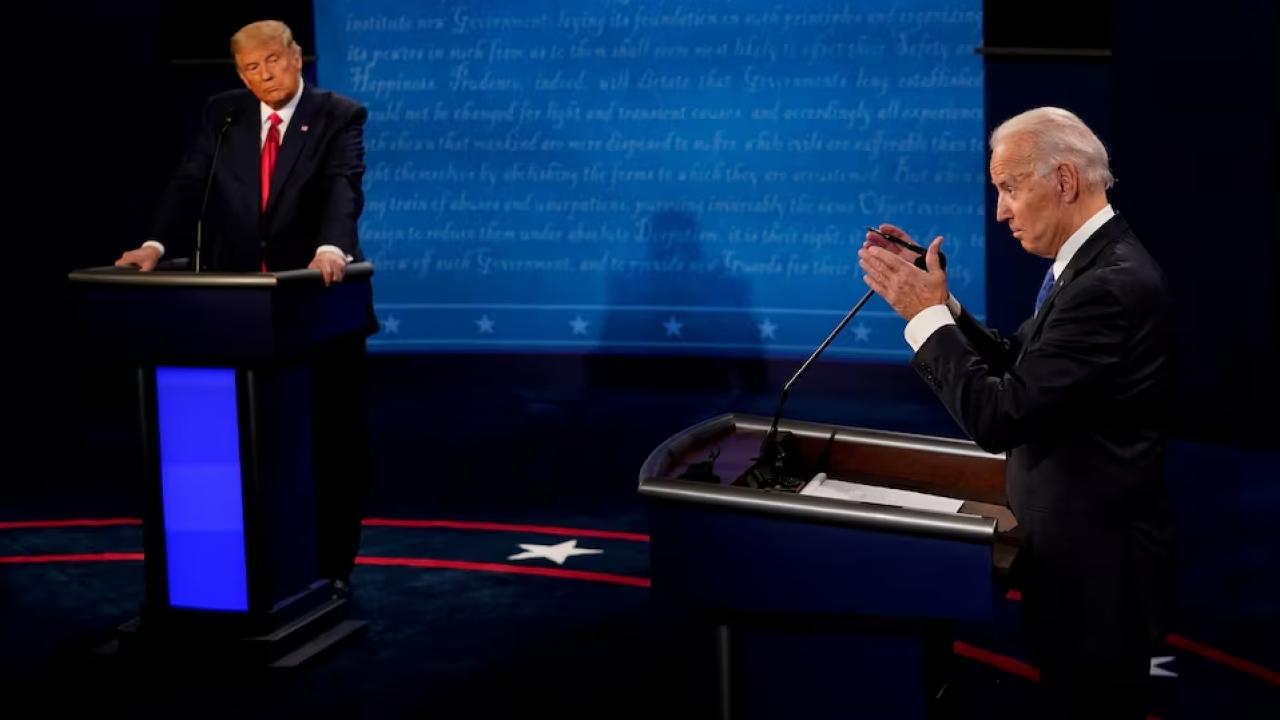
Nearly four months ahead of the presidential elections in the United States, polls show a tie between Donald Trump and Joe Biden. Regardless of who the next president is, the agenda with Latin America will continue to revolve around illegal immigration and China's influence in the region.
Although Joe Biden and Donald Trump have not been officially nominated by their respective parties and the presidential campaign has not formally started, tonight both will meet in a highly anticipated debate at the CNN studios in Atlanta.
Definitely, immigration will be one of the central issues of the debate and is also one of Washington's main priorities at this moment. And it will continue to be so, no matter who occupies the most important position in the White House starting next January 20. However, the styles of the Democratic candidate and icumbent president, Joe Biden, and the Republican, Donald Trump, are going to make a difference.
“With Biden we expect a combination of his own recent measures to strengthen border security with other more liberal ones to benefit undocumented immigrants. It would be a more balanced policy,” said Michael Shifter, former president and current fellow of Inter-American Dialogue in an interview with AméricaEconomía .
“Meanwhile—the expert added—no one expects Trump to be more moderate, but rather more radical.” However, Shifter deems that it will be difficult for the Republican to fulfill renewed campaign promises, such as the deportation of 11 million undocumented immigrants (something he failed to fulfill in his first term) due to the practical difficulties of achieving it. “However, the anti-immigration rhetoric will serve him to show that he has a very tough attitude,” Shifter said.
On the other hand, whoever it is, the next president will continue to monitor China's role in Latin America on several fronts: its growing political and economic influence in the region, its attempts to use the United States-Mexico-Canada Treaty (USMC) as a “back door” for its exports to the US market, and its role in the illegal trafficking of fentanyl to North America.
“Washington is concerned about Chinese investments in infrastructure in Latin America and its exports of technology and communications equipment,” said Shifter. The academic mentioned as an example the port of Chancay, in Peru, which is sponsored by China and is about to be operational, thus becoming a major gateway to increase trade between the Asian giant and Latin America. “The port is a key issue between Peru and the United States. There are concerns that China could use it as a spy tool,” he stated, although he did not specify what specific actions Trump or Biden would take in this regard.
Eric Farnsworth, vice president of Américas Society (AS)/Council of the Americas (COA), Washington, DC Office , told AméricaEconomía that, regardless of who the next president is, “the United States should stop complaining about China's influence and show why our approach is better. Have concrete results that lead to investment, trade and development. Let the benefits of working with the United States become evident.”
In that sense, Farnsworth highlighted that Washington must facilitate the use of regional cooperation tools, such as those offered by agencies such as the International Development Finance Corporation. “We don't use these tools and China takes advantage. It is not that Latin Americans want to work with the Chinese, it is that we do not provide alternatives to the region,” he pointed out.
In any case, greater commercial integration between Latin America and the US seems distant. Analysts agree that both Biden and Trump are essentially protectionists. “The trade agenda that the United States used to promote in the Western Hemisphere has become unpopular for both Democrats and Republicans,” Farnsworth said. In recent years, Washington has ignored requests from Uruguay and Ecuador to sign free trade agreements with each country, but just a few weeks ago a Sino-Ecuadorian trade liberalization agreement came into effect.
The relationship with Mexico, the priority
There is consensus that Mexico is and will continue to be a priority for Biden or Trump in 2025-2029, given the prominence of that country in sensitive issues for Americans, such as illegal immigration and fentanyl trafficking across the border, as well as the already mentioned Chinese attempts to use the USMCA to enter goods into the US market.
“Fentanyl is a big problem here (in the United States) and will continue to be so. For Mexico in particular, the issue is linked with China," explained Farnsworth, who added that the US Congress is going to pressure the next administration (whoever it may be) for results in the war against synthetic drugs also because lawmakers need to show progress to their electoral base, battered by the rising addiction to opioids.
That said, there would also be differences in this front under a second Donald Trump administration. It is very possible that the Republican will take a tougher position on the issue of synthetic drugs. Shifter does not rule out that Trump could even take some direct intervention to show strength and results, such as the use of drones in some anti-drug operation beyond the Rio Grande, which divides the bilateral border.
Likewise, it is possible that Trump will use the negotiations to review the USMCA, scheduled for 2026, to pressure Mexico on various fronts. “The renegotiation of the treaty is still two years away, but it seems to me that a Biden administration will take a more pacific view of the agreement, while Trump will try to use it as leverage to promote certain behaviors, such as reducing migration, or on trade issues in general." Farnsworth stated.
Shifter agrees. “The renegotiation of the treaty has greater risks if it is Trump who reaches the White House,” he said, explaining that although both candidates are protectionists, the Republican is “more extreme and less sensitive to the effects of his measures in Mexico and other countries, while Biden does take into account the consequences in other nations.”
Whatever the next administration is in the White House, it will try to impose higher regional content requirements within the framework of the USMCA renegotiation, as a way to limit disguised access of Chinese goods to the US, most visibly electric vehicles.
The rest of Latin America, without major changes
It is striking that the relationship between the US and a key country for the region, such as Brazil, is not closer, and there are no expectations that this will change after January 20, 2025. Farnsworth explained that, Although there is a good bilateral relationship, Washington does not give Brazil the level required by its size and role in the region.
Experts agree that there will be no major volatility with Lula da Silva, despite differences on issues such as Ukraine and China. However, there could be some friction with Trump, if, as Shifter warns, Lula becomes "irritated" with the Republican if the Republican decided to take some "undue" closeness with former conservative president Jair Bolsonaro.
For its part, the relationship with Colombia, which was often said to be the most important ally of the United States in the region, appears to be cooling under the government of Gustavo Petro, and the expectation is that, although the relationship will not deteriorate, neither will It will be strengthened, at least until the end of the leftist president's term, in August 2026.
The relationship with the coffee-growing country had been dominated by the anti-drug agenda, but cocaine trafficking has lost relevance among the American public opinion. “Cocaine production has increased in Colombia, but even so the United States has not said anything and has just shrugged its shoulders. That's really interesting,” Farnsworth said. Shifter, for his part, explained that Biden has done everything to maintain good relations with Petro, but it is possible that with Trump in the presidency for a second term, personalities clash between the Republican and the Colombian leader. “With Trump, there can be more rhetoric, and that can impact the relationship,” Shifter said.
Some confrontation with the Nicaraguan regime could also be expected from Trump. “There is no justification having a free trade agreement with a country that is a dictatorship actively working against the national interests of the US and even its own neighbors in Latin America,” said Farnsworth, who does not rule out that the next administration could suspend the agreement in response to the actions of the Nicaraguan regime in favor of illegal immigration to the US.
Ultimately, as Farnsworth explained, Washington's final position towards Latin America after 2025 will also depend on who holds key positions in the next administration, including the Secretary of State and the Assistant Secretary and even the Trade Representative. “If Biden is re-elected, the policy towards Latin America will be very similar. There will be no dramatic changes,” he said, although he added that there could be greater openness towards Cuba and a more pragmatic style to work with regional leaders of different ideologies, “from Milei in Argentina to Petro in Colombia.”










